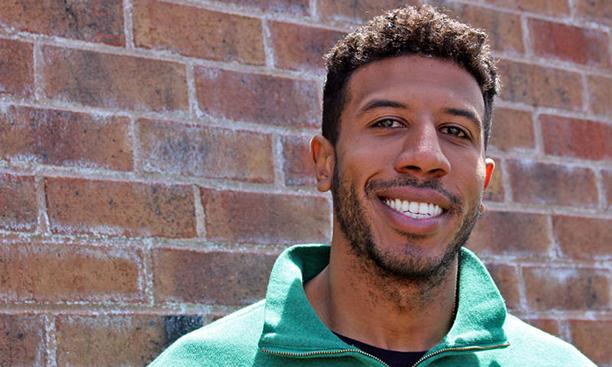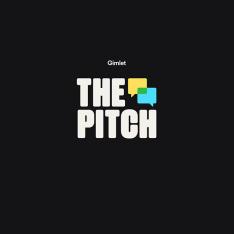
Kareem Maddox ’11 didn’t plan on working in the podcasting industry when he was a student at Princeton. A forward on the men’s basketball team, Maddox was first team All-Ivy and was named Ivy League Defensive Player of the Year in 2011 before beginning his professional basketball career overseas in the Netherlands and the United Kingdom. After two seasons in Europe, he returned to his hometown of Los Angeles and began volunteering at KCRW, an NPR affiliate based in Santa Monica. Around that time, Maddox also started interviewing investors about their worst investments for the Basis Points podcast, which he co-created with Nick Antoine ’12.
His efforts led to a full-time gig with Colorado Public Radio, where he worked as a producer, then eventually began hosting the local NPR “All Things Considered” program at KUNC in Greeley, Colo., before moving back east for a job at Gimlet Media in Brooklyn in 2017. As a producer at The Pitch, Maddox brings entrepreneurs to Gimlet’s recording studios to pitch their companies live in front of a panel of investors. Last month, Maddox sat down with PAW’s Allie Wenner.
On The Pitch
“The easiest thing to compare The Pitch to is [ABC’s] Shark Tank. There are four investors and one startup founder pitching for money. It’s different in that these are true startups, whereas a lot of the things on Shark Tank are actually small businesses or someone selling a consumer product. They want investments, but don’t necessarily need them. We deal with a lot of things that wouldn’t be good for Shark Tank, but are exciting or interesting businesses.“It’s also more in-depth — we spend about 30 minutes on one company and go deeper in terms of the questions that are asked by the investors. It gets kind of wonky, which I like, but it’s also a challenge because we have to figure out how to make everything understandable to our audience.”
The producing role
“I’m there for the whole process. We’ll start planning the recording event, and I’ll be looking for companies and talking to venture capitalists. A big way that we find companies is by talking to venture capitalists — they’ll send us people they think would be good on the show. And then I work with the founders and the investors to get them in their seats on the day of the event. And I’m there for the pitch, so [the other producers and I] listen and watch that happen.
THE PLAYLIST
Three more podcasts to check out this month
1. On My Smart Roommates, JACK WEISS ’86 reprises late-night dorm conversations with friends who’ve gone on to interesting and diverse careers, including NILS MUIZNIEKS ’86, MACE HACK ’86, and DAVID POWELSTOCK ’86 in the first three episodes — with more to come.
2. On Best of Both Worlds, LAURA VANDERKAM ’01 and co-host Sarah Hart-Unger discuss the challenges of balancing family with a demanding law career.
3. Public-health expert and physician CELINE GOUNDER ’97 explores gun violence in America, starting with history and culture, in the new season of In Sickness and In Health.
“And then we’ll take the raw pitch audio, which is anywhere from 45 to 90 minutes, and we’ll edit the audio and do a first round of cuts to get rid of everything that’s not interesting or not important. Then I’ll start writing through the episode, explaining things where we have to. Every founder is different, and not everyone is a great pitcher — it’s not always great tape. So I’m figuring out ‘what’s the best way to cut this so that it’s interesting but also true to what happened?’ And pop in where we have to in order to expand or move the story forward.
“Once we figure out the body of the pitch, we figure out how we need to follow up. Do we need to just go talk to the founder? Is anything exciting happening? Do we need to go talk to investors and record that?”
Education while editing
“It’s like I’m getting my own personal MBA. They say if you want to get into venture capital, you should be a founder first — you should start your own company and go through that process and those struggles and know what it takes to run a business. With The Pitch, I get to see founders coming in and going through that struggle and hear suggestions from investors. And we’re seeing so many different types of companies and industries — I’ve seen everything from organic makeup startups to financial tech companies. And I’ve been learning a lot about what makes companies successful or not successful. I’m using every opportunity to dive deeper into whatever pops out at me as interesting.”
On working in the podcasting industry
“The industry is a little scary at times. Panoply, which runs all the Slate podcasts, cut a big portion of their editorial shows. And Buzzfeed cut their audio division. A lot of people are trying to do podcasting as a side gig and sometimes it’s used as a marketing tool. But if you want do podcasting well and do it seriously, then it has to be a full-time thing. And that’s what Gimlet does — we’re a podcast company. And being at the place that is dedicated solely to podcasts is the right place to be as far as I’m concerned.
“It’s challenging because so much is required of a listener. You have to get them to go find your show and subscribe to it. And we’re competing for people’s time against things like TV and radio. ... We understand these challenges, and we’re figuring out how to solve them.”
Advice for anyone looking to get into podcasting
“I think public radio stations are the place to start. The people at most public radio stations are really smart, and there’s so much to learn from them. If you can spare a couple hours a week to spend in a newsroom just cutting tape, getting those basic skills, and learning — even if you’re a journalist, you cover stories in a different way for radio, and it’s super valuable to go spend a couple hours a week in a public radio newsroom if you can.
“Also, it’s really hard to make a good podcast, so start today. Record your friends, record your professors, record anything and go figure out how to edit it. Just take a weekend to learn it — it’ll be bad, but it’ll get better. And really there’s no substitute for that.”
Interview conducted and condensed by Allie Wenner
Alumni, if you have a podcast that you’d like to share with PAW readers, please email us at paw@princeton.edu.

